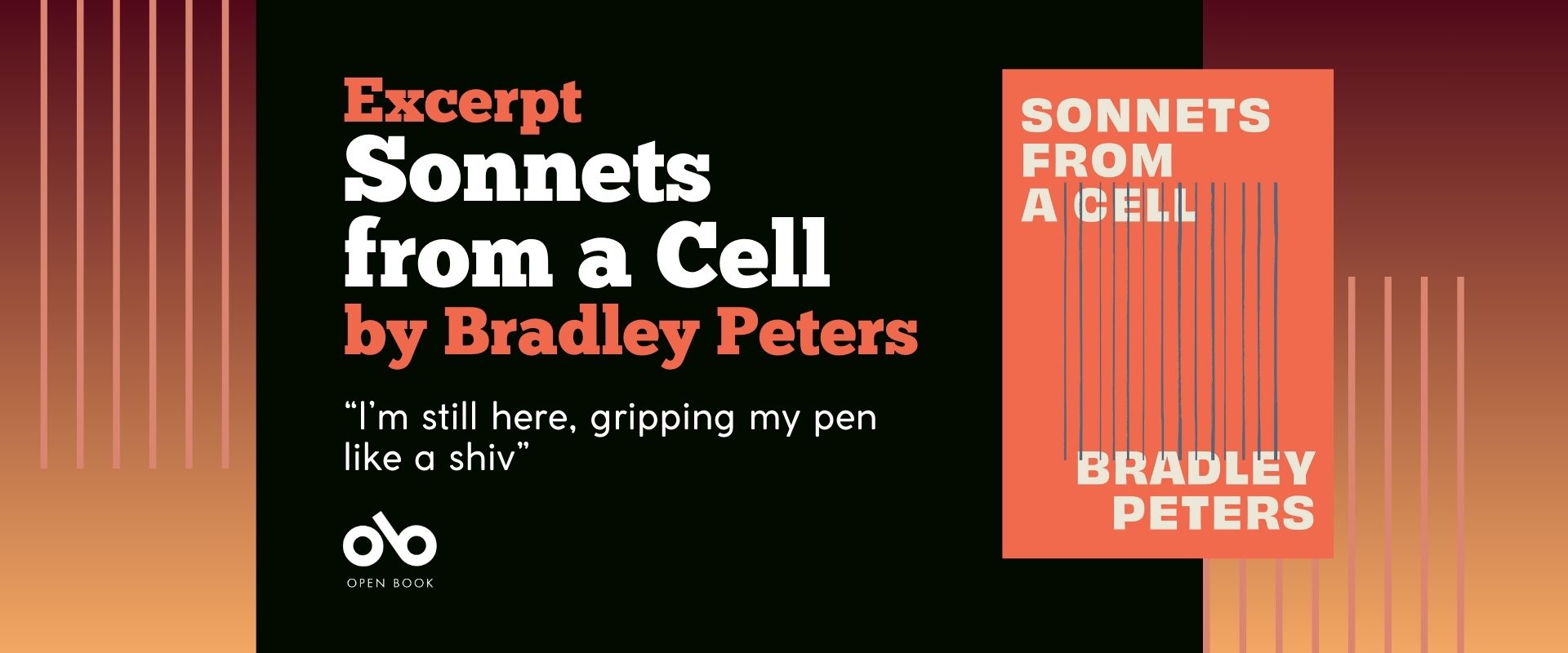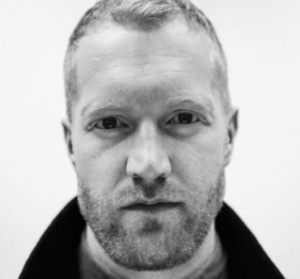Bradley Peters' Debut Poetry Collection Takes Readers into the Prison Experience & the Systemic Problems Within
One of the poems in Bradley Peters' Sonnets from a Cell (Brick Books) closes with the musing "A sonnet is not memory. More so/ It is a room the shape of my own face." This lyrical creativity and exploration of where art can take us when we cannot move is woven throughout the collection.
Presented as "poems for and about the incarcerated", Sonnets from a Cell draws on Peters' time in and out of the Canadian prison system as a teen and young adult, ruminating on the power structures and dehumanizing conditions that he experienced.
Stripped down and powerful, the poems are quietly damning of the problematic systems that lead to incarceration while celebrating the desire for forward movement, individuality, and, in all its forms, freedom.
A startling, timely, and immensely readable debut, it's an important addition to the conversation about the capitalistic and systemic inequalities underpinning our prison system and the damage they have wrought on both personal and cultural levels.
We're sharing an excerpt from Peters' haunting and powerful collection here today courtesy of Brick Books.
Excerpt from Sonnets from a Cell by Bradley Peters:
Daydreaming in The Shower Before Lights-Out
Ten more minutes, okay? A poem is
a way of dreaming after what
I want and can’t have I don’t even
know how this thing got here we inherited
— Sheryda Warrener, Floating is everything
Your CanLit News
Subscribe to Open Book’s newsletter to get local book events, literary content, writing tips, and more in your inbox
On all damn night. I need to get this out.
In White Rock after the divorce. Smoking
Again. A woman laughs in a sage dress.
Wind holds the drapes out like a dream and sounds
Wash themselves down with lime wedge and more sound.
Why do I return to these same four walls?
To feel free, to let loose. Moonwalk, high kick.
Now who’s on all damn night! Not lost, but twice
I appear on wet sideroads smiling up—
A seagull arcs overhead like floating
is everything—I jog the tide to sea,
I stand drenched from the bath in cool static.
A sonnet is not memory. More so
It is a room the shape of my own face.
Learning to Live
Silence taunts: a dare. Everything that disappears
Disappears as if returning somewhere.
— Tracy K. Smith, Life on Mars
The surf, the pier, the river darkening.
Red bell-buoys lashed to timber pilings
Chime softly. Rain hung up like a lost thought.
A fisherman hoses down his boat deck
With a smoke in his mouth. The tiny flame
Of a beach fire dissolves across the mist.
I want to learn to live. Seagulls gust up
Like paper scraps alongside Mission Bridge
Long before I am born then long after,
Storm light glinting off wings and everything
Made up of water and stardust. I want
While the cottonwoods laugh into the wind.
A car starts. Cicadas vibrate themselves.
I stand there in the humid air and breathe.
Red Birds
Perhaps prison itself is seen as a dehumanizing institution, meaning that the longer one serves,
the more one is seen as lacking humanlike capacities, becoming more like an animal over the course of a prison sentence.19
Red birds staring out, plucking themselves bald.
Red birds on a spiritual retreat.
Red birds tear bibles in half then eat lunch.
Red birds huddle and laugh with hooch-red tongues.
Red birds whiff the singe of mace on raw skin.
Red birds push all-in with twelve ramen packs.
Red birds, barred meds, heed the voice of madness.
Red birds strut past cell doors, wordless and slow.
Red birds, once freed, fly off into nothing.
Red birds rust-toned with false teeth and moth breath.
Red birds still wince at key chains and flashlights.
Red birds steal steaks to return each winter.
At night they dream. They clack their beaks and flap.
In the hush all their hearts patter like rain.
Fighting The Hills Have Eyes
I remember how the darkness of the blood
relinquished the darkness of my hands
and snaked into the darkness of the lake.
— Rob Taylor, The Other Side of Ourselves
To learn my lesson. I’m here to excel,
I tell myself and step into his room
Ten minutes till lockdown. The blue night-light
Obscures him there like blood in a dark lake.
To stand up tall. To move like fire. I’m here,
Hands held high, red head buzzed. He clips a jab
Off my ear. I whiff a left hook, clinch, slip
Back, huff into his chest, half off the bunk
As each second breaks out in warm fistfuls
Across my skull across rage across fear.
I’m here with his belly between my teeth.
To kick at the darkness. To not get pinned
In these cycles of breathe and just write it.
I’m still here, gripping my pen like a shiv.
A Charm Against Backsliding
In the criminal justice field, the raw material is prisoners, and industry
will do what is necessary to guarantee a steady supply.
— Steven Donzinger, The Real War on Crime
Everything is going to be okay.
Whenever the cell opens and its groan
Hinges on each new mistake recorded,
Stay calm and follow the revolving door.
The terms and conditions of a live wire
Include shame and hard labour for shit pay,
Bad dates, a halfway house with a dirt yard
Where bikes get matte spray paint and come and go.
Everything depends on a tin of butts,
God, kids, or who you ask. Some say structure.
Some, luck. Sometimes a white T and blue jeans
Makes me dance. Sometimes I stay in my room.
The low ceiling, same slow breath, same stillness.
It was the same time last year, the same place.
19 Deska, J.C., Almaraz, S.M., and Hugenberg, K. (2020). “Dehumanizing Prisoners: Remaining Sentence Duration Predicts the Ascription of Mind to Prisoners.” Personality and Social Psychology Bulletin, 46(11), 1614–1627. https://doi.org/10.1177/0146167220911496.
___________________________________________
Bradley Peters is a poet, actor, and carpenter from Mission, BC. His poetry has been published in numerous literary magazines, has been shortlisted for The Fiddlehead‘s Ralph Gustafson Award, has twice been the runner-up for Subterrain‘s Lush Triumphant Award, and in 2019 placed first in Grain Magazine‘s Short Grain contest. Sonnets from a Cell is his first book.





